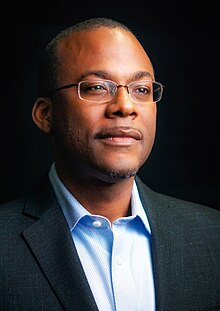The American Registry for Internet Numbers (ARIN) is the regional Internet registry for Canada, the United States, and many Caribbean and North Atlantic islands. ARIN manages the distribution of Internet number resources, including IPv4 and IPv6 address space and AS numbers. ARIN opened for business on December 22, 1997 after incorporating on April 18, 1997. ARIN is a nonprofit corporation with headquarters in Chantilly, Virginia, United States.

Saint Kitts and Nevis, officially the Federation of Saint Christopher and Nevis, is an island country and microstate consisting of the two islands of Saint Kitts and Nevis, both located in the West Indies, in the Leeward Islands chain of the Lesser Antilles. With 261 square kilometers of territory, and roughly 50,000 inhabitants, it is the smallest sovereign state in the Western Hemisphere, in both area and population, as well as the world's smallest sovereign federation. The country is a Commonwealth realm, with Charles III as King and head of state. It is the only sovereign federation in the Caribbean.

Iran's telecommunications industry is almost entirely state-owned, dominated by the Telecommunication Company of Iran (TCI). Fixed-line penetration in 2004 was relatively well-developed by regional standards, standing at 22 lines per 100 people, higher than Egypt with 14 and Saudi Arabia with 15, although behind the UAE with 27. Iran had more than 1 mobile phone per inhabitant by 2012.
An autonomous system (AS) is a collection of connected Internet Protocol (IP) routing prefixes under the control of one or more network operators on behalf of a single administrative entity or domain, that presents a common and clearly defined routing policy to the Internet. Each AS is assigned an autonomous system number (ASN), for use in Border Gateway Protocol (BGP) routing. Autonomous System Numbers are assigned to Local Internet Registries (LIRs) and end user organizations by their respective Regional Internet Registries (RIRs), which in turn receive blocks of ASNs for reassignment from the Internet Assigned Numbers Authority (IANA). The IANA also maintains a registry of ASNs which are reserved for private use.
Internet exchange points are common grounds of IP networking, allowing participant Internet service providers (ISPs) to exchange data destined for their respective networks. IXPs are generally located at places with preexisting connections to multiple distinct networks, i.e., datacenters, and operate physical infrastructure (switches) to connect their participants. Organizationally, most IXPs are each independent not-for-profit associations of their constituent participating networks. The primary alternative to IXPs is private peering, where ISPs directly connect their networks to each other.
The global digital divide describes global disparities, primarily between developed and developing countries, in regards to access to computing and information resources such as the Internet and the opportunities derived from such access. As with a smaller unit of analysis, this gap describes an inequality that exists, referencing a global scale.

The United Nations Information and Communication Technologies Task Force was a multi-stakeholder initiative associated with the United Nations which is "intended to lend a truly global dimension to the multitude of efforts to bridge the global digital divide, foster digital opportunity and thus firmly put ICT at the service of development for all".
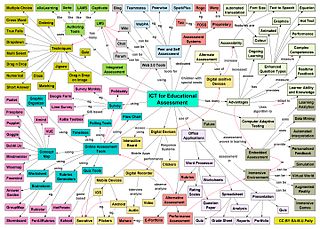
Information and communications technology (ICT) is an extensional term for information technology (IT) that stresses the role of unified communications and the integration of telecommunications and computers, as well as necessary enterprise software, middleware, storage and audiovisual, that enable users to access, store, transmit, understand and manipulate information.

The Caribbean Examinations Council (CXC) is an examination board in the Caribbean. It was established in 1972 under agreement by the participating governments in the Caribbean Community to conduct such examinations as it may think appropriate and award certificates and diplomas on the results of any such examinations so conducted. The council is empowered to regulate the conduct of any such examinations and prescribe the qualification requirements of candidates and the fees payable by them. It is now an examining body that provides educational certifications in 16 English speaking Commonwealth Caribbean Countries and Territories and has replaced the General Certificate of Education (GCE) examinations used by England and some other members of the Commonwealth. The CXC is an institution of the Caribbean Community (CARICOM); it was recognised as an Associate Institution of the Community in the 1973 treaty that created the Caribbean Community. Members of the council are drawn from the 16 territories and the region's two universities, the University of Guyana and the University of the West Indies.
Technological literacy is the ability to use, manage, understand, and assess technology. Technological literacy is related to digital literacy in that when an individual is proficient in using computers and other digital devices to access the Internet, digital literacy gives them the ability to use the Internet to discover, review, evaluate, create, and use information via various digital platforms, such as web browsers, databases, online journals, magazines, newspapers, blogs, and social media sites.

Bill Woodcock is the executive director of Packet Clearing House, the international organization responsible for providing operational support and security to critical Internet infrastructure, including Internet exchange points and the core of the domain name system; the chairman of the Foundation Council of Quad9; the president of WoodyNet; and the CEO of EcoTruc and EcoRace, companies developing electric vehicle technology for work and motorsport. Bill founded one of the earliest Internet service providers, and is best known for his 1989 development of the anycast routing technique that is now ubiquitous in Internet content distribution networks and the domain name system.
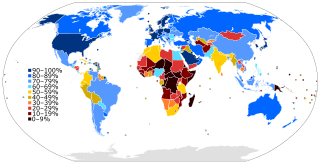
The Internet in Africa is limited by a lower penetration rate when compared to the rest of the world. Measurable parameters such as the number of ISP subscriptions, overall number of hosts, IXP-traffic, and overall available bandwidth are indicators that Africa is far behind the "digital divide". Moreover, Africa itself exhibits an inner digital divide, with most Internet activity and infrastructure concentrated in South Africa, Morocco, Egypt as well as smaller economies like Mauritius and Seychelles. In general, only 24.4% of the African population have access to the Internet, as of 2018. Only 0.4% of the African population has a fixed-broadband subscription. The majority of internet users use it through mobile broadband.
Internet network operators' groups (NOGs) are informal, country-based, or regional groups that exist to provide forums for Internet network operators to discuss matters of mutual interest, usually through a combination of mailing lists and annual conferences. Although these groups have no formal power, their members are typically influential members of the Internet service provider (ISP), Internet exchange point (IXP), regional Internet registry (RIR), operational security community, Internet Protocol version 6 (IPv6) operations, Domain Name System (DNS) and root zone operations, and other network operations communities, and discussions within these groups are often influential in the overall process of ensuring the Internet remains operational, robust, secure, and stable. They also allow networking professionals and other members of the research and technical communities to update each other on their work, share news and updates, exchange best practices, discuss new technologies or protocols, teach and learn from each other, network with other members of the community, and discuss current network- and Internet-related issues and challenges.
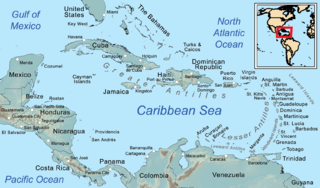
The Caribbean is a region of the Americas that consists of the Caribbean Sea, its islands and the surrounding coasts. The region is southeast of the Gulf of Mexico and the North American mainland, east of Central America, and north of South America.
The Ministry of Energy, Science & Technology, and Public Utilities (Belize) was founded in 2012. The Ministry is currently divided into the Department of Geology and Petroleum, the Energy Unit and the Science and Technology Unit. The Ministry is represented by Senator Joy Grant and CEO Dr Colin Young, and has an office in Belmopan.
Nelcia Robinson-Hazell is a Black Carib poet, community organizer and activist. She has spearheaded the development of policy initiatives throughout the Caribbean on issues regarding gender and indigenous identity. Serving as the president of the National Council of Women of Saint Vincent and the Grenadines, she began in the 1980s to change the organization toward political action. Recognizing a need to establish research on the needs of women, she was involved in the creation of both local and regional organizations to analyze and develop information about the socio-economic and political inequalities women faced. She created similar initiatives for indigenous peoples, beginning first in Saint Vincent and then expanding them regionally. Robinson has been involved in international directives including the World Summit for Social Development and the 1995 World Conference on Women, as well as follow-up conferences discussing such issues as poverty, economic empowerment and violence against women. She has served as a civil society representative on the Regional Judicial and Legal Services Commissions and as chair of the Commonwealth Women's Network.
Digital rights—human rights in relation to digital technologies—present particular challenges in the Caribbean countries, due to its geographies, political context, social inequalities and cultural diversity. While they face the same problem of digital divides as other regions, for islands the impacts of not accessing or understanding digital technologies can have particularly harmful consequences. Similar concerns could be found in terms of gender-based violence online, a global problem encompassing psychological, physical, emotional and sexual violence. This affects more acutely girls and young women and brings about special concerns within the Caribbean. However, there are other topics which are utmost problematic because of the history and type of applicable law system in countries from this region, such as in the case of digital identity and internet shutdowns. Despite variations across Caribbean countries, issues happening in one country can be replicated within the region or can affect people living in other countries.
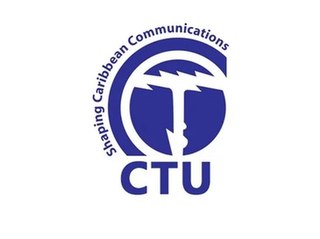
The Caribbean Telecommunications Union (CTU) is an intergovernmental organization established by CARICOM in 1989, to facilitate development of the telecommunications sector in the Caribbean.
